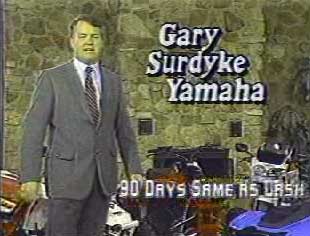
|
|
|
Monday 31 January 2005
Random Interesting Thing
Cable Ad: Comfortmaker Mike Shannon played right field and third base for the St. Louis Cardinals from 1962 to 1970, when he retired from baseball after being diagnosed with nephritis. From 1972 to the present, he has provided the color commentary for Cardinals games on the radio. As a baseball player, he was good but not great. He only had a lifetime batting average of .255 in 2,780 at-bats, but he was born in St. Louis, never played for any team other than the Cardinals, and has never lived anywhere else. In St. Louis, this makes him something of a god: I do not think that this guy could manage to pay for his own drinks anywhere in town. Not that he should be drinking at all, what with his kidneys. Anyway, his position makes him a natural pitchman in St. Louis for just about anything. In the 1980s, for some reason, this meant woodenly pitching residental HVAC equipment. You can tell he’s a radio guy in this spot; his delivery is great, but he looks like he’s been propped up with a 2x4. In my memory, at least, he’s always that squinty.
Comfortmaker, :30, 1.1mb Quicktime. Posted by tino at 23:22 31.01.05
Sunday 30 January 2005
Media
NBC Nightly News I rarely watch TV news, but last night the TiVo, for some reason, recorded the NBC Nightly News. Since they were broadcasting from Baghdad — something that’s surprisingly rare, except for short, stand-up talking-head shots — I gave it a try. After a while, I saw this:
This was the best picture they could find of Bush? A few seconds later, they launched into a promotion of Sunday morning’s Meet The Press, and switched — directly from the picture of Bush — to this:
More than a little bit different, eh? I am once again reminded of why I do not watch TV news. This is a comically minor thing, particularly since everyone watching the news is likely to already have an opinion of both John Kerry and George Bush. And yet the NBC Nightly News — which is allegedly journalism, ladies and gentlemen — picks a picture that makes the President look like a stoke victim, while John Kerry is looking off into the distance toward the Bright Socialist Future. I generally — remember, I don’t watch much TV news — find NBC and MSNBC to be the least blatantly biased of the TV news operations, so I’m surprised to see this. My guess is that some young liberal PA (or whoever puts together those shots; I’ll bet it’s someone low on the totem pole, though) thought that this was a perfect opportunity to Stick It To The Man. Well, congratulations: you have nurtured the Seed of Doubt in my mind — doubt about the extent to which I can rely on your employer for good information. Once again, life imitates The Simpsons: Kent Brockman talking about The Leader before the Movementarians buy KBBL broadcasting:
Kent Brockman talking about The Leader a moment later, after being handed a note that the Movementarians have bought his TV station:
In the TV news business, whenever you discover yourself doing something even vaguely and tangentially similar to anything that Kent Brockman has ever done, maybe you should stop. Posted by tino at 09:28 30.01.05
Saturday 29 January 2005
Random Interesting Thing
More From The Video Vault If you’re an ATV dealer and you can somehow prove that Yamaha does not have the best ATVs on the market, Gary Surdyke will give your wife a thousand dollars. Or at least he would in the late 80s, when this local-cable ad was produced. I recently found a whole 60-minute 3/4-inch tape of old local tv spots, so you may as well resign yourself to seeing a lot of them.
Gary Surdyke Yamaha, :30, 1.1mb Quicktime. Posted by tino at 12:57 29.01.05
Friday 28 January 2005
Urban Planning
Suburban Addresses The other night, the lovely & talented Nicole and I ate at Sweetwater Tavern, one of a small chain of quasi-upscale semi-‘western’ themed restaurants. I say ‘quasi-upscale’ because there’s nothing particularly fancy about the food, the service, or the decor: it’s just that nothing is horrible. There’s adequate staff to handle the volume of business, the food is tasty and arrives hot, and there are no fluorescent lights in the place. I consider this the bare minimum for operating a restaurant: unfortunately the restaurant industry seems to consider this quite a luxurious experience. Anyway, so we went to Sweetwater Tavern, and we encountered these strange flyers touting a favorable review of the place from the Washington Post. I say that these flyers were ‘strange’ because we were already there. We’d been sold. At this point our opinion of the place would be formed largely by our own experience, not a review from the Post. Anyway, what was particularly interesting about the flyer was the way the Post described the location of the location we were at:
I’d never realized the address of the place before: 14250 Sweetwater Lane. And if that wasn’t helpful, it’s near Multiplex Drive. In other words, it’s in the Sweetwater parking lot, near the movie theater. This is helpful if you’re lost in the maze of strip malls that surrounds the restaurant, but utterly useless if you are looking for it from, say, anywhere else. ‘Off Route 28 just south of I-66’ would be helpful. But no, this is the suburbs, and so everything’s address reflects its position not relative to any street you might be familiar with, but rather to its own parking lot. The other two locations aren’t on other Sweetwater Lanes — though really it wouldn’t be surprising to find a place declaring its parking lot a street and naming multiple ones the same thing in the same area — but rather on ‘Gatehouse Plaza’ and ‘Waterview Plaza’. Waterview Plaza is just off Leesburg Pike west of Cascades Parkway (i.e. right about here), and ‘Gatehouse Plaza’ is at the intersection of Gallows Road and Arlington Boulevard — two major thoroughfares. Anyone vaguely familiar with the area could find a place described as ‘at Gallows and Arlington’ or ‘On Route 50 just west of the Beltway’. We don’t get this, though: instead we get parking lots named as streets, and five-digit addresses thereon. Posted by tino at 15:12 28.01.05
Random Interesting Thing
Tiny House “This isn’t awesome” — but the commercial sure is. I wonder whether Geico has two different ad agencies? Most of their ads are horrible, but this is pretty clever.
Tiny House, :30, 2mb Quicktime. Posted by tino at 12:40 28.01.05
Thursday 27 January 2005
Corporate Idiocy
Central Planning and Big Business Don Boudreaux quotes Chris Dillow: We all know a centrally planned economy is a stinking idea. So why is a centrally planned company a good one? (This question was raised by Hilary Wainwright years ago in Arguing for a New Left. Disappointingly, it’s been ignored.) Hayekian arguments can be applied to company bosses as well as central planners. For me, what’s really offensive about capitalism isn’t (just) the huge wages paid to bosses, but the fact that their claims to justify such rewards — that they are capable of managing massive institutions — are utterly unfounded. Boudreaux disagrees: Dillow’s question is fair, but the answer seems to me to be obvious: private companies, even massive ones, are private. Shareholders voluntarily buy (and sell) stock in these firms: creditors voluntarily lend (or not) money to these firms; workers voluntarily work (or not) for these firms; suppliers voluntarily supply inputs (or not) to these firms; and consumers voluntarily buy goods and services (or not) from these firms. Boudreaux is right inasmuch as the money earned by Titans Of Industry is not earned at the point of a gun. But he doesn’t address the question of whether the central-planning model is a good way to run a company. Think of your average corporate environment: Everyone uses the same computer and the same software, because that’s efficient. Everyone gets the same chair — except those in Success Track #6 and above, who get nicer chairs — because that’s efficient. If you run out of toner and the supply department is also out of stock, you won’t be printing anything for weeks or possibly months, because (usually) it is entirely forbidden to go down to Office Depot and buy some out of petty cash. Not being able to get work done so the company can save $4 on toner is, you see, efficient. Et cetera, et cetera. Unhappy companies are all different. If you’ve ever worked for a large company, insert your own example of horrible inefficiency in the service of Procedure here. Scale the average American company up a million times and give it an army and ICBMs, and what you’d have is largely indistinguishable from the Soviet Union. As everyone participating in such a company is doing so voluntarily, there’s no real moral problem with this. But it’s still central planning, and it’s still going to be inefficient. Posted by tino at 14:09 27.01.05
Tuesday 25 January 2005
Computer Idiocy
Why I Don’t Use Windows If you are, for some reason, still using Windows, you might find this little movie worth your while. It turns out that the Windows Indexing Service — which appeared to just be a drag on system performance all these years — actually works. It’s just that, to get Windows to use it, you have to prefix your query with an exclamation point in the search box. Because that’s obvious and convenient, not to mention well-documented. And because you’d want the default search behavior to be the slow and frustrating one. Posted by tino at 19:50 25.01.05
Copyright Issues
Endangered Gizmos EFF offers up this list of endangered gizmos, products that are at risk of disappearing (or that have already disappeared) because the do some harm to (or, in may cases, merely frighten) the copyright industry. I can’t help but think that ‘endangered gizmos’ — that’s the EFF’s phrase — is a misnomer, though. These things will always exist as gizmos as long as there’s any demand for their capabilities; but as long as the copyright industry is determined to never evolve, they will not exist as products, i.e. it will be difficult or impossible for anyone to make significant amounts of money from any of them. This — the failure of large business plans due to the hidebound thinking of the copyright industry — has already happened twice, by my count. The first failure was the famous collapse of the telecommunications industry in about 2000. It’s true that shenanigans at Worldcom were a part of that (Worldcom was essentially lying about its capacity, traffic, customers, and revenue, and since Worldcom was (at least on paper) the largest factor in the telecommunications industry, this threw off everyone’s picture of the industry as a whole, leading to bad decisions), but it’s important to remember that in 1998 and 1999 everyone thought that the near future would bring a lot more traffic to the network. Look at the kind of traffic that Napster was generating, and that without any advertising, with dodgy technology, with significant legal risk to the users, and with nobody in particular interested in seeing to it that there was content available! Imagine what would happen when the movie studios and record companies started taking advantage of this new distribution mechanism! You’ll still have to imagine, of course, because it still hasn’t happened. The few online music- and movie-selling ventures are limping along (relative to the illegal underground file-sharing networks). They all take, as their first commandment, Thou Shalt Not Be Able To Copy The Files Freely, which is probably a reasonable condition. But then they charge their users more, generally, than they would pay if they were to go out and buy a CD. They’re paying for the convenience of not having to go to the record store, the copyright industry says. Ah, but they’re not getting as much value as they would if they bought a CD. We’ll just pretend that’s not true, the industry says. And then they’re surprised when consumers manage to accurately evaluate the relative values of the products anyway. In any case, I’m still sitting here on a network connection no faster than I had seven years ago, and literally billions of dollars have gone down the tubes. On the other hand, the continued viability of the record industry in exactly the same form has ensured that the public is not denied access to the talents of top-notch professional ‘artists’, like Ashlee Simpson. The second failure was the celebrated collapse of the AOL/Time Warner merger. To be sure, there were a lot of reasons this merger failed, but in the end I think the single most significant cause was the unwillingness of Time Warner to consider taking advantage of AOL’s ‘walled garden’ of an online service to distribute their products. People have made fun of AOL for years, and rightly so. The AOL service sucks; very soon after AOL started offering flat-rate service plans and stopped paying content partners for time users spent in the partners’ sections of AOL, there’s been nothing available on AOL that isn’t also freely available on the public network. A few people, those particularly tied to their AOL e-mail addresses or to a particular pre-existing forum and its inhabitants on AOL, will keep paying. But other than to those people, AOL just doesn’t have a lot to offer. But wait: since the merger, AOL/Time Warner owns both an enormous collection of movies, TV shows, music, photographs, magazine articles, books, etc., etc., etc., and a walled garden of an environment with which to distribute these things — most of which produce exactly no revenue for the company as things stand today. AOL subscribers have access to none of this, though: with an AOL account, you don’t even get to watch CNN video for free, because they’d rather try to get an additional $12.95 a month from you than to increase the value of your $24 a month AOL subscription. Again, billions of dollars down the drain. I’m sure that there are hundreds more stories of similar things, if smaller in scope. This is the real danger of the copyright industry’s greedy risk-aversion. I have little doubt that I will always be able to do what I want with information that comes my way. In some cases, this might require strange software downloaded from places like Sweden; in others, it might require building little devices that are, strictly speaking, illegal. Any scheme that would be totally impossible to get around would also be too cumbersome to use as intended, and the market would reject it in short order.
But since it’s impossible to sell things anonymously on any large scale, it’ll be impossible to base any businesses on new capabilities. Remember that the copyright industry tried to sue the VCR out of existence. They seem to have learned nothing from the fact that, far from destroying their business, the VCR allowed the movie studios to create new products that have earned them billions and billions of dollars.
Sony missed out on potential sales from MP3 players and other gadgets because it was overly proprietary about music and entertainment content, the head of Sony Corp.’s video-game unit acknowledged Thursday. What Sony apparently has yet to realize, though, is that they have also missed out on potential sales of music and entertainment content itself because they’re overly proprietary about it. Sony (and its competitors, both in the consumer-electronics industry and in the copyright industry) will eventually fully see the light, or they’ll be replaced by other companies that have seen it. If it doesn’t happen soon, though, we’ll spend yet more time deferring the enormous profits and entirely new industries that new technology makes possible. Posted by tino at 12:54 25.01.05
Sunday 23 January 2005
General Idiocy
A List Of Websites Blocked At Panera The following forty-six websites were all observed to blocked by the nanny filter on the network at Panera Bread late in the afternoon of 23 January 2004. I got the list of URLs to try by loading in the contents of my own RSS aggregator, as well as the blogrolls from instapundit.com, dailykos.com, and atrios.blogspot.com. There seems to be a slight anti-conservative bias in the list, but this could be due to nothing more than the fact that Glenn Reynolds — widely considered ‘conservative’ — has approximately one zillion sites on his blogroll, and that the filter blocks websites related to ‘weapons’. Certainly there are also a bunch of lefty sites that are also blocked for no real discernable reason. For each site that seems to be improperly blocked, I’ve stuck in a short quote that should serve to illustrate what the site is like. Many of the sites branded as “adult/mature content” — as Tinotopia once was — probably got that way by using four-letter words once in a while. The question then is: why is Panera protecting its customers from this? I can understand them not wanting people looking at farmsluts.com in there, as it might put other customers off their feed. But political weblogs? I think the problem is that the main market for the nanny filter consists of schools: and so when you use the network at Panera, you are assumed to have the intellect and sensitivities of a child.
Posted by tino at 21:25 23.01.05
Sunday 16 January 2005
Random Interesting Thing
Bulk Jazz at Panera I was sitting in Panera Bread last night, fumbling around with proxies in an attempt to get around their ham-fisted network filtering. Now they’re blocking an art gallery’s website for ‘nudism’. The site does, indeed, feature photos of paintings and sculptures featuring people without clothes on, but I’d hardly classify this as ‘nudity’, much less ‘nudism’. I didn’t have time to check whether they block the National Gallery Of Art, but I’d bet the answer is no: even the people at SonicWALL would see that that’s silly. They’re also blocking Cory Doctorow, for reasons that are an utter mystery to me.
I could not help thinking of how this stuff must be produced: I imagine that someone, somewhere, locks a bunch of musicians in a room with horns (it’s heavy on horns, the better to cut through the Panera background noise) and dope, turns on a tape recorder, and goes away for a few days. When the someone comes back he duplicates the tape and sends it off to people who need jazz in bulk. It’s sold by the yard. We used to joke that Dressel’s Pub, in St. Louis, always played the World’s Longest Jazz Album, because it never ended and it seemed, at least, to never repeat: but at least that peculiar album contains recognizable and good music. Anyway, I present for your listening enjoyment two snatches of jazz by the ton, as recorded last night at Panera. You can download the file here, or listen to it in the embedded Quicktime thingy that will appear below if your computer supports Quicktime. It’s kind of quiet, and there’s a lot of background noise, but this is how Bulk Jazz is meant to be, er, enjoyed.
Posted by tino at 12:53 16.01.05
Wednesday 12 January 2005
Unpredictability
Unpredictability at McDonald’s I’m not talking about the unpredictability of ‘how will they screw up my order today’, but about what the heck it is that McDonald’s serves in the first place. McDonald’s has been in a crisis of leadership for a while now, and this might be a symptom: but it is today impossible to walk into a McDonald’s restaurant and tell what they serve. Most of the menu lists the various ‘value meals’ on offer, and a tiny portion on the side lists fries, etc. à la carte; but there’s no mention at all on the menu of several of their fringe offerings, their fancy salads, breakfast burritos, etc., etc. The company is still spending the money to equip the restaurants to make this stuff; but it’ll only be sold to people who are already aware that it’s available. What does McDonald’s serve? Who knows. Does McDonald’s A serve the same things as McDonald’s B? Who knows. Ask the person behind the counter, and they likely won’t know either, because they only started there yesterday. Of course, I can really only say this definitively for the McDonald’s near my house. Your McDonald’s may be completely different: which possibility does not, I think, undermine my point. One of the main things on offer at McDonald’s is consistency, and I haven’t seen much of that there any time lately.
At a McDonald’s on the Ohio Turnpike not long ago, NIcole and I got these orders of fries: one ‘medium’, and one ‘large’:
I think the ‘large’ did in fact have a few more fries than the ‘medium’, but both of them were obviously short. If this were much of an aberration, I wouldn’t bring it up; but it’s not unusual at all. I ask you: does this look like the product of a company with its act together? Perhaps the purpose of the pared-down menus is to allow them to serve you anything at all. Without recourse to the menu board, you’ll just have to eat it. And you’ll have to like it, god damn it. In the grand scheme of things, all of this is a small problem. But it’s a big problem for McDonald’s, should one of their competitors decide that they can take away some of McDonalds’ business simply by making the process less stressful and annoying — and less unpredictable. Posted by tino at 19:34 12.01.05
Tuesday 11 January 2005
Random Interesting Thing
Hardrock, Coco, and Joe This song has been stuck in my head for almost a month now, ever since the WGN Yule Log broadcast. The Three Little Dwarfs [sic], 4.2mb Quicktime. Posted by tino at 17:51 11.01.05
Monday 10 January 2005
Police-State Watch
Anything You Do Not Say May Be Held Against You In Truro, Massachusetts, the police are stumped, according to the New York Times:
Attempting a DNA dragnet out of frustration is one thing; that the cops will plainly tell the press that people who don’t ‘voluntarily’ cooperate with a search with no probable cause will effectively be suspects is the alarming thing here. Posted by tino at 12:28 10.01.05
Friday 07 January 2005
Random Interesting Thing
Life In The Sticks We came downstairs this morning to find the Sheriff in the driveway. His Jeep and a few other County vehicles were a few hundred feet from the house, so I immediately assumed that they had come to take me away for my criticisms of Bushitler — you know, that’s happening all over the place — and that they were preparing for a long standoff. They must have heard somewhere about the abundant stocks of canned soup in the basement. It turns out, though, that they were just trying to recapture a horse that’s on the loose, and that has been on the loose, it appears, for several months now. All of these pictures link to 800x600 popup versions. In the woods like this, the cowboys can’t do their thing with the ropes, so I gather the plan is to shoot him with a tranquilizer dart. Unfortunately, the deputies trooping around in our woods — if you can ‘troop’ on ground that’s halfway to vertical — were not successful in driving him into the open where the sleeping-horse trailer could be wheeled up. Because there were only two deputies, the horse was easily able to outflank them and head back up to the fire road at the top of the property, and thence, probably, to the clearing for the power lines and ultimately to anywhere there’s electricity. Before they went into the woods in the first place, Nicole and I were in the process of telling the deputy about this old road when the woman from animal control came up and told us to go inside and leave everything to the professionals. Had she not been so quick to assert the Authority Of The State, they probably would have got some information that would have helped them. The deputy who was talking to us was pretty friendly, though. Probably cops are, of necessity, better at dealing with people than are animal control officers. Posted by tino at 13:15 7.01.05
Thursday 06 January 2005
Corporate Idiocy
Unpredictable DRM ‘DRM’ means digital rights management, which is in turn a euphemism for ‘crippling consumer electronics so as to protect dubious future revenue streams while seriously endangering current ones’. I’ve written elsewhere about the idiocy and myopia of the copyright industry, so I’m not going to get into that at any length here. DRM, though — particularly the kind we’re seeing from TiVo and Windows Media Center Edition these days — is another perfect example of the micro-unpredictability of modern American life. Here’s part of an e-mail that was quoted in an article at The Enquirer: Turns out that a couple of days ago, HBO started encrypting all of its programs with CGMS-A. They allow you to “copy” a program that you record from their signal once. The trouble is that they consider that one-time copy to be recording the program onto your hard drive, not taking it from the hard drive to a DVD. THAT SUCKS OUT LOUD and I am extremely angry, as you can imagine. The files are HUGE and, even though I have a 200 gb hard drive, I can’t keep them there forever. MediaCenter records tv shows with a dvr.ms extension So the capabilities of your equipment can change, now, after you’ve bought it. We’re actually used to this, to an extent: every few months, Apple releases a software update that (sometimes drastically) changes the capabilities of my computer. But in those cases the capabilities of my computer increase. This week, news came out of a system called ‘Video Content Protection System’, which is aimed at further restricting what you can do with ‘content’. “The primary goal if you read FCC regulations is to create a situation where it is not possible to randomly, indiscriminately distribute content over something,” said Kevin Saldanha, HP’s DVD+RW program manager, speaking at a press conference here. For example, the system is designed to prevent users watching a locally “blacked out” football game in New York from viewing a video stream sent to them from friends in California, who are not subject to the blackout restrictions. […] The new discs will be somewhat more expensive than their DRM-free counterparts […] Likewise, the new players will probably be priced somewhat higher than conventional players […] So the copyright industry proposes to increase my costs and, ultimately, obsolete my existing investment in gadgets, not so that I can have some new capability, but so capabilites that I have today can be taken away. And for what? To make sure that people don’t watch ‘blacked out’ football games? They have got to be insane. When you buy something, particularly a piece of electronic gear, you do a calculation in your head that ultimately produces what business-school types call the net present value to you of all the future use of the purchase. But with ever-more-‘innovative’ DRM, though, you can’t really do that calculation, because in the middle of the equation there’s a big cloud with a question mark on it: this cloud represents the whims of the copyright industry. When buying equipment that’s possibly subject to this dynamic DRM, you have to do some mental calculations based not only on how useful you think the gadget is going to be, but on how likely it is that its capabilities are going to change to your detriment in the future. And that you can’t predict at all, because it’s all about the decisions of people high up in an industry famous for mercurial decision-makers, heavy cocaine use, and all-around flakiness. I am actually pretty sanguine about DRM as a whole. The market will ultimately reject anything that gets in the way of ordinary use: note that the only downloadable-DRM’d-music scheme that’s had any success at all — and even this is pretty modest — is Apple’s iTunes Music Store. Tracks from the iTMS are DRM’d, but in a way that most users will never notice (if you’re not Cory Doctorow, anyway). In any case, the iTMS DRM is almost trivial to defeat if you really want to. In the end, all the Broadcast Flag and incompatible DVD standards are going to do is what DVD region-coding did: slow down the adoption of new technologies, and increase everyone’s cost by introducing enormous amounts of inefficiency into the system. The consumer-electronics companies will manufacture thousands or millions of these new devices with features that nobody but the copyright industry wants, and nobody will buy them. The consumers will pay for them, of course, in the form of higher prices for the next wave of devices, the devices that will actually reliably do what their purchasers want. Such is it with all unpredictability in the marketplace. Most industries at least think that they’re working hard to make things more reliable and predictable; only the copyright industry and their consumer-electronics lapdogs are actively working to move things in the other direction. Posted by tino at 16:02 6.01.05
Wednesday 05 January 2005
Unpredictability
Unpredictability As A Drag On The U.S. Economy and Society You hear quite a bit these days about the importance of the rule of law and of property rights as necessary precursors to development and the emergence of a healthy society. One of the more common examples is that of the ability to get clear title to land or other property. If you can be sure that your control of a piece of property will be secure in the future, you’re more likely to invest in it — you might build a house, for instance. If there’s a good possibility that some day, someone might come along and tell you that you have to leave, you’re more likely to build a shack, thus somewhat reducing your exposure to this risk. It doesn’t matter whether you’re squatting on land that its rightful owner might someday want vacated, or whether you run the risk of the Ministry Of Central Planning kicking you out: the effect is much the same. You can even see this at work in the United States in those few situations where property rights are not secure. In a part of central St. Louis County, Missouri, a couple of small cities have, for the last twenty years or so, been seizing property though eminent domain and selling it to shopping mall developers. To be sure, the result has probably been an improvement. The area in question has turned into a hub of sorts, with a number of major highways and roads coming together there; it’s much better suited to shopping malls than it is to the small factories, derelict warehouses, and one-bathroom houses that were there before. Since they started seizing this land, the local property values have gone way up, and the sales tax generated from the shopping malls have allowed the cities — mainly Richmond Heights — to lower their property taxes while at the same time providing more and better services. But even as the property values have risen, the area has become seedier. The properties that haven’t been redeveloped are mostly going to pot: the parking lots are full of holes and weeds, the paint is peeling, and the signs are missing letters. None of the people who own houses and retail space around the giant mall are willing to make any investment in their property, because there’s no guarantee that they’ll be able to realize a gain on that investment: in that small part of a small suburb in the middle of the United States, the free market in real estate has been replaced by a command economy, and the people there are reacting rationally to their condition. So you need what you might call macro-predictability in your society in order to avoid turning into something like Zimbabwe or, for that matter, most of sub-Saharan Africa. But what applies at the macro level usually applies at the micro level, too, and this is what disturbs me: American society seems to be becoming more and more unpredictable on a micro level, and I think that these thousand cuts are adding up to a significant drain on our culture and on our economy. I plan to write about this regularly, because I see this problem everywhere. But to begin with, and as an example of what I’m talking about, I’ll tell the story that got me thinking along these lines: I have a lot of money lodged with the Bank of America. The Bank of America is one of the largest banks in the United States, but they don’t have a branch anywhere near where I live. This isn’t a problem — or it wasn’t, anyway — because I did everything by calling them on the phone. Last week, I had a Bank of America CD mature, and I needed to have the funds paid into another account there, rather than having the CD roll over at an interest rate of something like 1%. This happens about every month, so the procedure is pretty straightforward by now: I call the branch that the accounts are tied to and tell them what needs to happen, and a few days later I get some receipts in the mail. This time, though, it turned out that the person I’d been dealing with for the last year had transferred to another branch. The person now handling my calls told me that the Bank of America did not, and had never, redeemed CDs into checking accounts over the phone. I explained that this hadn’t been a problem thirty days ago, and that I had in fact visited that very branch of the bank — 700 miles away — last April, specifically to sign their forms and file with them the documents that would allow me to do this stuff over the phone. I was told that ‘for liability reasons’ they didn’t keep any of that on file (?!), and that the only way to do this was for me to come into the bank in person. The branch person said, then, that maybe the people at the B of A’s 800 number could help me. I tried that, and was told (after a long wait on hold, of course) that they do keep that stuff on file, but that none of my stuff was on file, and that therefore they couldn’t help me. I called the branch back and talked to the manager, who grudgingly — she was actually sighing — told me that, this one time, she’d make an exception and allow me to do this over the phone, provided that I faxed fifteen pages of documents to her. I did, and presumably my transaction took place. I can’t say for sure, because I still haven’t received the receipts in the mail. This is a horrendous customer service failure, of course, but the bigger problem is that I still have no idea what the procedure here is. There are four candidates here:
I understand that the bank wants to make sure that random people are not fiddling with other people’s money. But one would think that if that were the goal, the bank would institute some means of positively identifying people over the phone: passwords, or challenges and response pairs, or something beyond the current social-security-number and mother’s-maiden-name system in place now, a system that they (rightly) don’t even trust. Instead, the hapless customer runs up against shifting requirements and contradictory information from different parts of the company — a company, no less, that wants me to trust them with my money. It’s nuts. I’ll solve my problem by withdrawing all the money from the Bank of America, and putting it somewhere that seems more competent. But where’s that? As absurd as my experience with B of A has been here, it’s not too far off par for the whole banking industry. (See here and here for previous experiences of egregious bumbling on the part of Suntrust Bank.) At a bare minimum, Bank of America’s inability to act consistently cost me (and them) an hour of phone calls the other day. Ultimately, it’s going to cost me the trouble of moving that money to a bank with a branch that’s local to me, and in the future it’s going to keep me from being willing to do business with banks that aren’t local unless it’s really worth my while. Thus because Bank of America cannot act in a predictable manner in this one small area, I am reduced to banking pretty much the way I would have in 1905: by walking into a building that says ‘Bank’ on the front, and sitting down at a desk. Add these little inconveniences and inefficiencies up, and multiply them by millions of people, and you probably have a significant drag on the economy. I’ve already got a list of five more examples in my pocket: watch for them in the coming days. Posted by tino at 15:25 5.01.05
Tuesday 04 January 2005
Questionable Statistics
The Washington Post and the ‘Trade Deficit’ People get really confused when talking about currency value. Paul Blustein, the Washington Post’s economics writer, has an article in today’s paper about the state of the U.S. dollar. But he gets it wrong: The dollar’s downward move, after all, stems from a massive imbalance in the U.S. economy, as reflected in the country’s burgeoning trade deficit. Since Americans import more than they export — the gap is running at about $600 billion a year — foreigners effectively lend the difference, taking the dollars they receive for their goods and investing them in U.S. assets such as Treasury bonds. This assumes that the only thing to do with dollars is to spend them on buying Microsoft Windows etc. or Treasury bonds. It also ignores the fact that about a third of the ‘trade deficit’ involves foreign subsidiaries of American companies selling things back to their U.S.-based parents: so the ‘trade deficit’ is more accurately $400 billion, or about 4% of the U.S. economy. That this is ignored is especially puzzling given that this very fact is mentioned further down in the article. Imports are decreasing: British automaker Jaguar, for example, is enjoying brisk business in Western Europe, with new car registrations up 24.5 percent in the first 10 months of 2004. But in the United States, sales have fallen 15 percent, and losses have grown as revenue per vehicle, which is measured in dollars, sinks below manufacturing costs, which is measured in pounds. Jaguar is, incidentally, owned by Ford, which is an American company. However, that 24.5% rise in Jaguar sales — profits from which flow back to Ford (an American company) — doesn’t count as an increase in U.S. ‘exports’ because the vehicles themselves are sent from Coventry. However, any Jaguar sales to the United States (as well as cars and car parts being shipped from American-owned factories across the river from, say, Ontario) count as imports to the U.S. If this isn’t a method of measurement guaranteed to produce alarmist results, I don’t know what is. In any case the Post is skeptical: That’s the type of dynamic that ought to help correct the U.S. trade deficit. So far, however, that hasn’t happened. And now we come to the meat, to my real point. This Dynamic Has Not Corrected The U.S. Trade Deficit, allegedly. Thus for the trade gap to narrow, exports not only have to increase, as they have been, but they must also rise much faster than imports. The opposite has been occurring, as Commerce Department figures for October showed. Exports hit a new monthly high of $98.1 billion, which was 11.3 percent more than the previous year’s level. But imports were $153.5 billion, 18.5 percent more than a year before. And, of course, we will conveniently ignore the minor point that all of these measurements are in dollars. This is why people don’t understand currency values: they’re so used to using currency as a yardstick that they continue to do so when they’re talking about the value of the currency itself. It’s as if we re-defined the meter as being 150 cm long, and then wrote hand-wringing stories about everything getting 50% smaller. It’s not that simple, of course, because the meter is an arbitrary measure while the dollar represents — one hopes, at least — something in the real world. The dollar has dropped by 16.5% since February 2002, so when you’re measuring imports and exports in dollars, you have to take that into account. The Washington Post compares the dollar’s fall since early 2002, but the change in imports and exports since late 2003 — and it doesn’t really specify where any of these numbers come from (‘the Commerce Department’ is kind of vague), so I’ll just use the numbers at hand. They are likely to exaggerate my case, but they’ll do well enough to illustrate. Exports, the Washington Post says, have increased 11.3%, while imports have increased 18.5% — when measured in dollars. During the same time, of course, the value of the dollar dropped, particularly when you’re talking about transactions with people in other countries. So if we take the dollar as being worth 16.5% more at the beginning of this period, with our crude constant-dollar calculation we get an actual increase of 2% in imports, and an increase of 27.8% in exports. If this isn’t a fast enough shift, I don’t know what the hell he’s looking for. These numbers are inaccurate, not least because not all of my figures represent the same period of time. But my numbers are not necessarily more inaccurate than the Washington Post’s, and I don’t get paid for this. It is bad enough to have the government thoroughly Sovietizing the statistics it releases, without the press willfully — really, the idea that the Post is deliberately misrepresenting this stuff is less frightening than the idea that they’re that stupid — misleading their readers about the meaning of all this. Posted by tino at 11:54 4.01.05
Monday 03 January 2005
General Idiocy
Dr. Pepper’s Baby and Child Care The other day, I saw an ad on TV that featured, on the screen, a mother and her young tot going through some kind of amusement-park ride, again and again. They were sitting in a little car that looked like it was supposed to be a piece of cheese, or Spongebob after he’d let himself go, or in any case some kind of yellowish blob. The ride involved shuttling through some kind of Tunnel O’ Fun, and emerging from doors painted and sculpted to look like a clown’s face. The child was ecstatic, giggling and clapping and bouncing up and down in the blob. So was the mother, the first time. The second time they emerged from the tunnel, the mother looked like she was still having fun, but not as much fun. The third time they emerged from the Enormous Clown Phizz, Mom looked definitely unenthusiastic. After a couple more goes, she was slumped over in the seat, passed out from all the Fun, while the child was still screaming and clapping with delight. The voice-over then explained all this: “When it comes to quality time with your kids, no sacrifice is too great.” The point of the ad, which has nothing whatever to do with my point here, was that there was No Sacrifice At All in drinking Diet Dr. Pepper, which allegedly tastes no worse than regular Dr. Pepper. In the 1940s, Dr. Benajmin Spock wrote his famous book on child care, saying to parents: “you know more than you think you do”. At that time, nearly every human activity was being subjected to study by ‘experts’, and I gather that the child-care-book market was full of contradictory advice. New parents were paralyzed with fear that they’d do the wrong thing: should we leave Johnny to cry in the bed until his scheduled feeding, or should we feed him when he’s hungry? Dr. Flzmbzl recommends one approach, while Dr. Mrmptdg recommends the opposite! And both say that Johnny will surely grow up to be a Homosexual Communist if we get this wrong! That’s nuts, of course: taking care of children is one of the few things that humans can do instinctually. You Know More Than You Think You Do. You might call that the Dr. Spock philosophy of parenthood. And now we have the Dr. Pepper philosophy: No Sacrifice Is Too Great in the pursuit of Quality Time. If we take that at face value, we would have to conclude that losing a limb would be preferable to spoiling Quality Time. Oh, sure, since you’ve only got four limbs to lose, it would have to be something really important, like a birthday trip to Chuck E. Cheese or something. But look on the bright side: you could turn it into a Teachable Moment! Little Madisyn or Holden or D’Artagnan should to learn to tie a tourniquet sooner or later, after all. This struck me as idiotic not just because of my ordinary curmudgeonly nature, but because lately Tivo has been recording, and I have been watching, a TV show called Nanny 911. The basic schtick: the TV people find a family with children that are out of control. They send in a nanny from Nanny Central — which is a thatched-roof cottage somewhere in England, no joke — who shows up and consults for a week. Nanny then delivers a prescription and flies back to Blighty, leaving the family much happier than before.
The parents of these families seem much more intelligent and thoughtful than most people you see on TV, and the impression you get is one of overwhelming Averageness. I suppose the idea is to get parents in the audience to identify with the people on TV: if the TV families were — as are more characters on ‘reality’ TV shows are — presented as a freak show, it wouldn’t be as compelling. It functions as a how-to show for parenting, but heavy on theory and outlines — strategy rather than tactics, like This Old House instead of We Broke Into Your House While You Weren’t Home And Painted All Your Stuff Purple (or whatever that show is called). Anyway, back to the subject at hand: No Sacrifice Is Too Great. In the photo above you see Karen and Matt Rock, who appeared in Episode #1 along with their, er, lovely children. You can see video of them here. The Rocks (no word on whether they’re any relation to football player/professional wrestler/actor ‘The Rock’) are completely ruled by their children. You really ought to watch that video to understand what this means. No Sacrifice Is Too Great, which means that Karen and Matt have not slept together — and I mean that literally: they have not slept in the same bed — since Dylan was born four years ago. It seems that Dylan is insecure about sleeping on his own, so Karen has spent every night in his room since then, while Matt sleeps with the dog. The problem, as is revealed by the Nanny, is that these children are subject to no discipline, no rules, no requirements, and no expectations at all. Karen’s instinct is to prevent her children being ‘upset’ at all costs. If they’re ‘not feeling well’, they can put their feet on the dinner table. If they’re ‘afraid’, she’ll sleep with them for years on end. And if they scream and yell, she’ll infallibly come running to comfort them. Matt’s approach makes a little more sense: he loves his children, but he understands that there are worse things for them than being transiently unhappy over, say, getting used to sleeping alone. He tells his daughter to take her feet off the table before Karen overrules him, saying that a two-year-old can’t understand that feet do not belong on the dinner table. I’m sure that there’s a lot more going on in this relationship than we see on TV, of course, but as I don’t know these people I can only talk about what’s on the screen. And what’s on the screen is interesting, something you don’t see much in modern TV: the TV Dad is not a bumbling idiot. In fact, in every one of the episodes I’ve seen, the ‘fault’ for the family’s state is ultimately the mother’s. In every one of these families, the mother appears to have adopted a No Sacrifice Is Too Great approach. ‘No Sacrifice Is Too Great’ is really just another way of saying ‘The Kids Always Get Their Way’. The unsurprising result is chaos. Posted by tino at 23:59 3.01.05
|

















